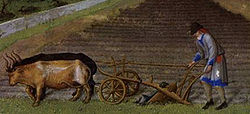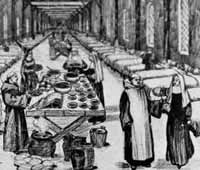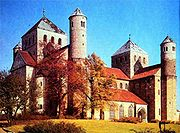Introduction
Middle age in the European history was the period ranging from AD 1000-1299. It covered the 11th, 12th and 13th centuries. Middle age was characterized by a rapidly increasing population that saw the economy growing at a faster rate. However, this trend diminished with the eruption of wars in Europe and a series of calamities for example, the Black Death. Political organization and religious groupings were less organized during this period. This period saw the spread of Christianity throughout Europe but illiteracy derailed the efforts by majority of people to practice it. However, religion still remained the backbone of every activity as can be seen below.
Main body
Agriculture during the middle age was practiced with the use of less technology. Tools employed included Oxen and sometime due to their shortage farming could be done by use of hand hoe. Farming was practiced using the Feudal system where land was owned by Lords and tenants would rent them. Therefore, farming was done by tenants yet they did not own any piece of land. These farms were farmed according to communal system and they largely practiced rotation system (Loudon, 4-19). Land was left to rest for at least two years to regain fertility. This was because there were no other fertilization methods. Livestock’s which would have otherwise provided manure were reared in small numbers hence could not provide enough manure for very large chunks of land. Fertilization also took the form of clearing forests and burning them to provide fertility to the soil. Legumes which normally provided nitrogen for the soil were rarely grown further deteriorating the soil structure. Soil erosion was also a common thing during this period due to poor farming methods such as the shallow plowing of grain. Excess soil moisture was removed through surface draining because tile drain method was not employed during the feudal times. During this period, variation of crops was a rare thing and people specialized in cultivation of particular crops. Vast portions of land were left uncultivated sometimes due to their infertility and sometimes due to inadequate workers to work on them (Allison, 17). Towards the end of Middle age, modern agriculture slowly gained popularity and the Feudal system was replaced.

During the Middle age, diseases were associated with divinity. There were very few methods of curing a patient and people relied on divine intervention most of the time. The fall of modern Roman Empire further worsen the hygiene conditions during this period. People had no access to public medical facilities, clean water and regular bathing. Medicine was dominated by religious myths and a person who fell sick was considered to have received punishment from God. Therefore, the only way an individual could be cured from any sickness was through asking for forgiveness from God. Hospitals during this period were religious establishment and the doctors were the priests. However, Universities trained people on medicine especially men and any other traditional cure to illness was considered witchcraft. Surgery was practiced using Opium as anesthetic especially amputations and setting up of broken leg. Wine was used in the cleaning of wounds. However, the biggest blow to this era’s medicine was the break of the contagious plague that led to the Black Death. Although they considered this as a punishment from God, methods to improve on their medicinal practice went underway.

Patients are given medicinal care and treatment from nuns and monks in a hospital. It should be noted that church structures served as hospital for the sick.
In the middle age, illiteracy was dominant among the population at the time except for the scribes who helped in translating the Bible. Education came about as a result of influence from the church. Education, combined theology with philosophy especially from Aristotle to form curriculum studies in schools. Education was provided to enhance priesthood in the society. A part from theology which was taught, other subjects included arts and science which were being offered especially to the male student. However, most women were exempted from education and were only taught basic art skills that were essential in their lives. Especially, the poor women were excluded from the convent where education was being offered..

The diagram above shows a church in Germany that helped in the creation of school curriculum and provided foundation to the study of theology.
Conclusion
In conclusion, it can be asserted that the middle age was characterized by many religious believes. They were considered very superstitious people and were very reluctant to innovation. This period saw priests and other religious scholars as the source of consultation in cases of out break of diseases and religious buildings serving as hospitals. Generally, People in this era lived as a community especially when it came to land issues. Due to the practice of Feudalism, most poor people lived together as one in a given location provided by their master. The rich were few during this period and most of them were the land owners.
Works Cited
Allison, Franklin E. Soil Organic Matter and Its Role in Crop Production. Elsevier, 1973 PP 17-25.
History of medicine. Web.
Holland, Bart K. Prospecting for Drugs in Ancient and Medieval European Texts: A Scientific Approach. CRC Press, 1996 pp 1-15.
Loudon, John C. An Encyclopædia of Agriculture: Comprising the Theory and Practice of the Valuation, Transfer, Laying Out, Improvement, and Management of Landed Property; and the Cultivation and Economy of the Animal and Vegetable Productions of Agriculture.
Longman, Rees, Orme, Brown, and Green, 1831. Original from the University of California. 2007